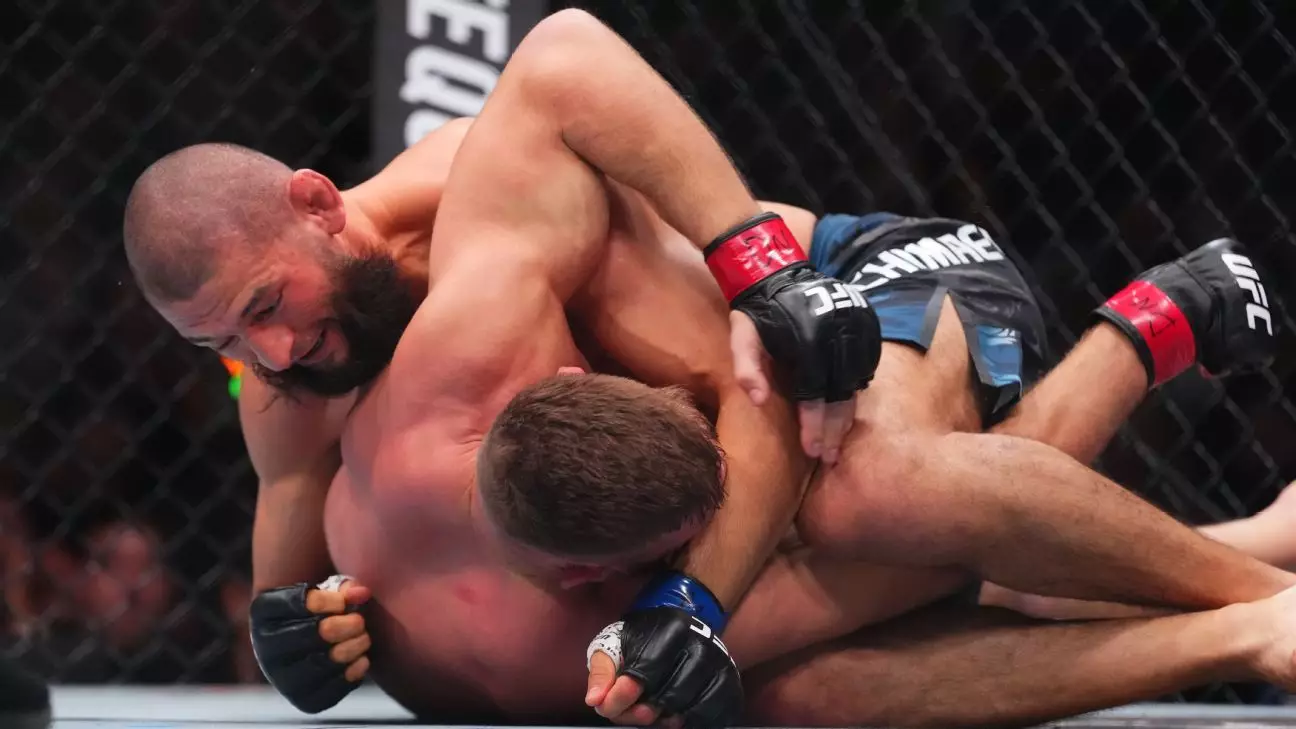Khamzat Chimaev’s recent victory at UFC 319 isn’t just a win—it’s a statement that the fighter once heralded as a future champion has fully arrived. His record-shattering performance against Dricus Du Plessis exemplifies a level of control and ferocity rarely seen in the octagon. For years, critics and fans alike have debated whether Chimaev’s rise was a hype train or a legitimate threat to the sport’s elite. The answer is clear now: his dominance transcends mere hype, affirming that he is capable of redefining the middleweight landscape in the UFC.
His relentless pressure, technical mastery, and strategic grappling fused into a masterclass that left the audience in awe. The fact that he set a UFC record for most total strikes in a fight—529 strikes—speaks volumes about his aggressive style and stamina. To put that into perspective, this isn’t just a high tally; it is a physical and mental barrage that overwhelms opponents. Chimaev’s ability to control space and dictate the pace demonstrates not just talent, but a profound understanding of fighting psychology and game planning, even if he claims to “never have a game plan.”
Overcoming Adversity and Medical Hurdles
What makes Chimaev’s ascent even more compelling is the trail of obstacles he has had to overcome. When he debuted in the UFC in 2020, he exploded onto the scene with back-to-back victories in what seemed like an unprecedented sprint through the competition. Yet, his journey was far from straightforward. A severe bout with COVID-19, coupled with ongoing medical and visa complications, threatened to derail his momentum. Despite these setbacks, Chimaev demonstrated resilience and an unwavering commitment to his craft. His ability to come back stronger, more refined, and more aggressive indicates a fighter driven by an unbreakable will.
His victory, therefore, isn’t merely a showcase of physical prowess but a testament to perseverance. In modern sports, where injuries and off-the-mat issues often slow down careers, Chimaev’s story serves as a powerful reminder that setbacks can be catalysts for growth when met with resilience. His journey underscores the importance of mental toughness in achieving true greatness, and it now leaves his competitors with a clear message: underestimate him at your own peril.
Technological and Tactical Mastery in the Octagon
What distinguishes Chimaev in a modern MMA landscape saturated with skilled athletes is his ruthlessly tactical approach combined with technical finesse. His conversion of 12 out of 17 takedown attempts during the fight is no accident; it’s a reflection of his dedication to wrestling and grappling mastery. He spent over 21 minutes controlling Du Plessis—a nearly unthinkable feat in a five-round bout. Holding an opponent on the mat and maintaining dominant positional control isn’t just a display of strength; it’s an indication of his deep understanding of fight dynamics.
Chimaev’s penchant for setting a brutal tempo—dropping his opponent on the mat in every round and then controlling the action—frustrates adversaries. Du Plessis, who was often smiling between rounds, visibly wore down under the relentless pressure. The fact that he was able to secure a late submission attempt with a guillotine shows that Chimaev isn’t just a one-dimensional striker or wrestler; he adapts, reacts, and presses forward even under duress. His ability to seamlessly blend striking with grappling controls makes him a nightmare for anyone standing across from him, and his record-breaking strikes further emphasize his offensive versatility.
Implications for the Future of UFC Middleweight Division
Chimaev’s spectacular performance elevates him beyond a mere contender—he becomes a true force to reckon with in the UFC hierarchy. His victory sets a new benchmark for excellence and establishes him as the unequivocal champion of control, pressure, and aggression. His challenge now is to sustain this level of dominance and to face other top-tier fighters who will undoubtedly test his resilience and fight IQ.
The UFC’s middleweight division seems poised for a seismic shift, with Chimaev potentially on the brink of a reign that could reshape the competitive landscape. His story isn’t just about a record-setting performance; it’s about a fighter who embodies the relentless pursuit of mastery, an attitude that could trigger a new era of fighters emulating his style—combining grappling, striking, and brute endurance. If he continues to evolve and adapt, the division could see a revolutionary chapter emerge, with Chimaev leading the charge.
In the end, the sport’s evolution hinges on fighters like Chimaev who dare to push boundaries. His victory isn’t just a personal milestone; it’s a declaration that the era of overwhelming athleticism and strategic innovation is here—powered by a fighter who refuses to accept anything less than greatness.

